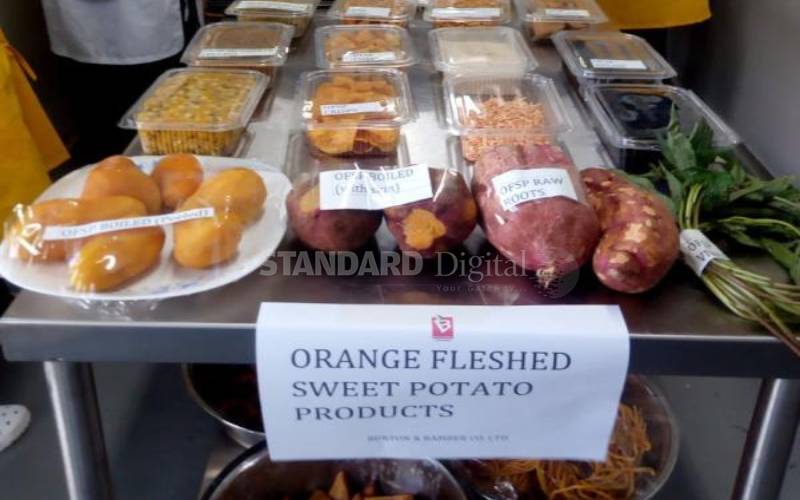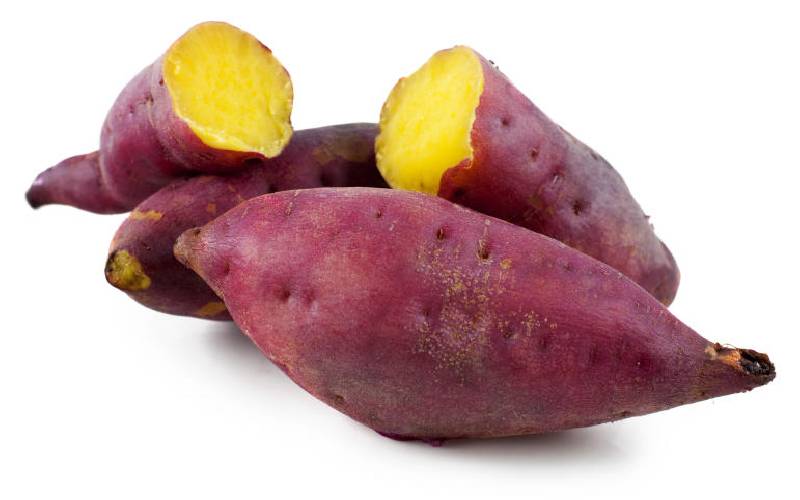
In 2014, Catherine Otaga was just another sweet potato farmer, growing and selling them at the local market in Busia County.
But she was making peanuts and was barely surviving. Then she attended a value addition workshop by Kenya Agricultural Livestock and Research Organisation (Kalro) and things started to look up.
As part of a group called Tanga Kona Commercial village in Busia, they were taught lessons on sweet potato farming and vines multiplication. The icing on the cake was how to add value to sweet potatoes and make snacks like cakes and cookies, which are nutritious.
Health benefits
Unlike snacks made from wheat, sweat potato ones are tasty and nutritious. Nutritionists say sweet potatoes are among the best sources of Vitamin A. Scientists have determined that sweet potatoes contain anti-inflammatory, anti-diabetic, and anticancer properties.
Fully aware of these benefits, Otaga embarked on translating the skills and knowledge learnt at the training to build her value addition brand.
Setting up the structures
For a start, she bought vines at a trusted dealer and planted orange-fleshed sweet potato and cassava, which did well. The new orange fleshed sweet potato varieties include Kabonde, Jumla, Kenspot1, Vitaa and SPK004. Within six months, they were ready for harvest.
Now enlightened, she steered away from selling raw tubers.
“Back then, I was putting in too much but the output was discouraging. I could only sell my commodity to a few buyers in the market and I made little,” recalls Otaga.
But value addition offered numerous possibilities for the 42-year-old farmer.
From farm to fork
The processing starts after harvesting the sweet potatoes. The next step is washing the produce to remove impurities, peeling, drying and crushing it into flour, a process that multiplies the value of the sweet potatoes immensely.
“Before value addition I used to sell 1kg of raw sweet potato at Sh25 but after value addition which involves processing into flour, it increased to Sh55,” says the farmer.
Her crop yields also increased, with an acre producing 80 bags of sweet potatoes from the initial 40 bags each weighing 50 kilogrammes.
Her first clients of the flour were neighbours and family and with time, word spread and orders increased.
Having seen how much she was making, Otaga upgraded from processing flour to preparing sweet potato snacks. To expand the business, she used her savings to buy machines for peeling, crushing and drying the tubers and equipment for making cookies, bread, cakes, crackles, chapati and crisps.
“I bought the machine at Sh6,500 from jua kali artisans. I also bought a special drier for the crisps. It also comes with a motorised machine for slicing them into smaller sizes,” she says.
How does she do it?
According to Otaga, making the value-added products is a painstaking process that needs patience.
“For tasty snacks, you need to use quality sweet potatoes. That is why I use sweet potatoes from my farm and trusted farmers.”
She keeps her the solar drier machine under a shade to avoid contamination and preserve vitamin C from evaporating from the sweet potatoes.
After producing the cookies, Otaga packs them into various sizes.

“I pack the crackles and cookies in 25 grams to 150 grams which cost Sh10 and Sh100 respectively,” she says.
To help with work, she has employed 14 workers and in a day they produce 600 pieces of cookies and on a good day she makes at least Sh6,000 to Sh8,000 from the cookies alone.
How did she get certification for mass production?
Before selling products to market, she first visited Kenya Bureau of Standards (Kebs) offices for certification.
“After submitting all the required documents to prove that I am processing my products under hygienic conditions, my products were approved by Kebs for mass supply. They also visited the site to confirm everything,” said Otaga.
So far, so good.
“From this business, I have managed to educate my seven children and develop my life," says Otaga.
She supplies her yummy products to food industries and retail stores in Nairobi and other major cities. Locally, she supplies to schools, agricultural show events, supermarkets, retail shops within Busia and neighbouring counties.
“I also sell my raw products to food factories for processing. I get most of my clients from seminars, workshops, training and referrals by Kalro,” she shares.
Though now settled, Otaga says her biggest challenge has been the expensive equipment needed for mass processing.
To process the flour and snacks, she needs heavy machines, a blender, mixer and big frying pan, which are costly.
“The equipment is expensive but since my products are consumed daily I have been able to acquire machines gradually and this has reduced the cost burden,” she says.
Otaga sharpens her craft by constantly engaging with experts and research institutions.
“I have also succeeded in my business by visiting Kebs for more lessons on food safety. The environment I prepare my products is always clean.”
Going forward, she plans to set up a potato processing factory to meet demand for her products.
“My dream is to see Busia becoming a sweet potato and cassava flour hub in Kenya. I also plan to open more stores and sell my products outside Kenya.”
Want to get latest farming tips and videos?
Join Us
 The Standard Group Plc is a multi-media organization
with investments in media platforms spanning newspaper print operations,
television, radio broadcasting, digital and online services. The Standard Group
is recognized as a leading multi-media house in Kenya with a key influence in
matters of national and international interest.
The Standard Group Plc is a multi-media organization
with investments in media platforms spanning newspaper print operations,
television, radio broadcasting, digital and online services. The Standard Group
is recognized as a leading multi-media house in Kenya with a key influence in
matters of national and international interest.
 The Standard Group Plc is a multi-media organization
with investments in media platforms spanning newspaper print operations,
television, radio broadcasting, digital and online services. The Standard Group
is recognized as a leading multi-media house in Kenya with a key influence in
matters of national and international interest.
The Standard Group Plc is a multi-media organization
with investments in media platforms spanning newspaper print operations,
television, radio broadcasting, digital and online services. The Standard Group
is recognized as a leading multi-media house in Kenya with a key influence in
matters of national and international interest.




